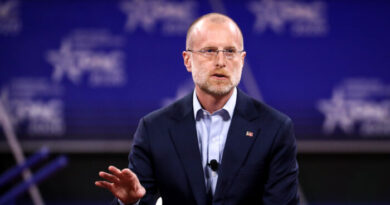Trump Believes Freeland’s Exit is Beneficial for Striking Deals
U.S. President-elect Donald Trump stated that Chrystia Freeland’s exit from the Liberal cabinet will enable Canada to engage in more favorable negotiations.
In recent weeks, the incoming U.S. president has referred to Canada as a “state,” echoing a previous jest that Canada should be the “51st” U.S. state and that Prime Minister Justin Trudeau should be its “governor.”
Trump characterized Freeland’s conduct as “totally toxic” and “not at all conducive to making deals that serve the very unhappy citizens of Canada.”
“She will not be missed!!!” Trump asserted.
Freeland closely interacted with the initial Trump administration while serving as foreign affairs minister, a role she was appointed to shortly before Trump took office as the 45th U.S. president on January 21, 2017.
Additionally, Freeland emphasized that adopting a “Canada first” approach would be “incorrect” and indicated that Americans elected Trump to “abandon the burden of global leadership.”
“The reality that our friend and ally has begun to question the very value of its global leadership role highlights the necessity for the rest of us to chart a distinct and sovereign path,” she remarked.
“You may feel today that your size allows you to compete with your traditional adversaries and ensure victory. But if history teaches us anything, it is that no nation’s supremacy is everlasting,” she asserted.
Tariff Threat
During his recent presidential campaign, Trump also expressed intentions to renegotiate the new U.S.-Mexico-Canada trade agreement (USMCA) established in 2018. This trade deal can be revisited starting in 2026.
However, it is not this potential review that has reshaped Canadian politics, but rather Trump’s threat to levy a 25% tariff on Canada and Mexico if they do not enhance security at their borders.
This threat was prominently referenced in Freeland’s resignation letter to Trudeau, which he termed a “grave challenge.”
She noted being “at odds” with Trudeau regarding the management of Canada’s finances at a time when it is crucial to preserve its “fiscal strength” to effectively confront a “tariff war.”
“This entails opposing ‘America First’ economic nationalism with a resolute effort to advocate for capital, investment, and the jobs they create,” she wrote.
Trudeau met with Trump in Florida on November 29, just four days after the tariff threat was made. He brought along his senior aides, the Canadian ambassador to the U.S., and one minister, Dominic LeBlanc, responsible for public safety.
Freeland, being the second-highest ranking official in the Trudeau administration and having led the renegotiation of NAFTA while chairing a cabinet committee focused on Canada-U.S. relations post-Trump’s victory, was not present at the meeting.
LeBlanc later mentioned after the Mar-a-Lago meeting that he had exchanged phone numbers with Trump’s designated commerce overseer, Howard Lutnick.
“Incoming secretary Lutnick reached out to me via text the following day and expressed a desire to meet again soon to continue discussions about the border,” LeBlanc told CBC News on December 1.
A few hours after Freeland submitted her resignation, Trudeau appointed LeBlanc as the new finance minister.




